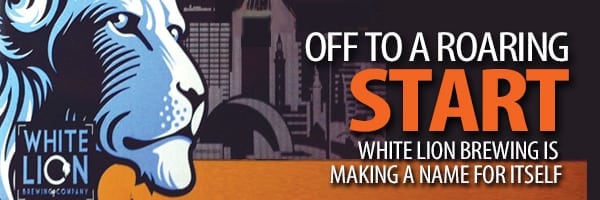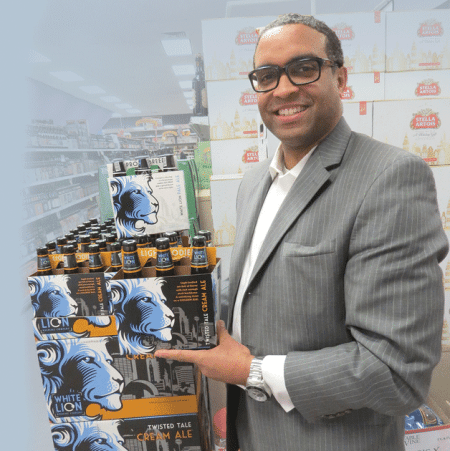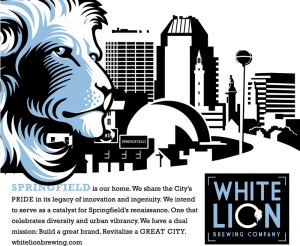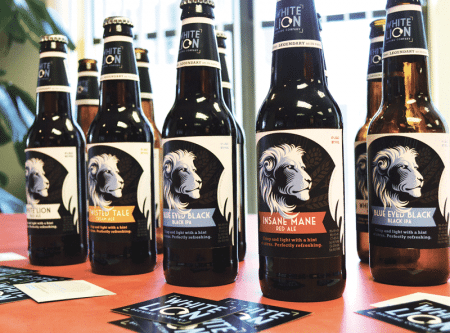
Off to a Roaring Start
White Lion Brewing Is Making a Name for Itself

Ray Berry Jr., seen here at a display of White Lion at Table & Vine, says his company’s mission is to build a great brand and help revitalize a great city.
Summing up the now-defunct agency’s mission, Berry said it was created to help entrepreneurs understand the risks of a business venture and overcome their fear of accepting those risks, assist them with forging business plans, and guide them with the task of developing the connections and relationships needed to succeed.
“I think it’s important for any entrepreneur to map and frame out their ideas, utilize the networks that are in the community, and not be afraid to take advice along the way,” said Berry, who served the MSDC as deputy director. “There are individuals out there who have a tremendous amount of proven experience in establishing companies and moving them forward. If you have a vision or dream, and once you get through that fear of risk and get over that hurdle, you utilize the resources available and push your dream forward.”
Today, Berry is definitely practicing what he preached 15 years ago as he pushes his own dream forward.
It’s called White Lion Brewing Co., a venture he launched just a few months ago — after nearly four years of planning — with some working capital, an imaginative brand, an intriguing mission statement, and that aforementioned willingness to accept risk.
And in that short time, he has enjoyed what could only be called a roaring start while making White Lion “Springfield’s beer,” even though it’s not brewed here — yet.
As it states on the bottom of the six-pack container that features many of the city’s landmarks, “Springfield is our home. We share the city’s pride in its legacy of innovation and ingenuity. We intend to serve as a catalyst for Springfield’s renaissance. One that celebrates diversity and urban vibrancy. We have a dual mission: Build a great brand. Revitalize a GREAT CITY.”
The first component of that mission is still a work in progress, but Berry believes important strides have been made. The second? Well, he intends to be a big part of the renaissance he sees coming for Springfield by bringing the brewing operation to the city, and with it, jobs and a renewed sense of pride that in some ways is already evident.
“The city of Springfield does not have a product that folks can rally around, and it was important to me to create one,” said Berry, who by day is vice president of Administration and Finance for United Way of Pioneer Valley. “We want to be a game changer, a difference maker, part of the community fabric, part of the legacy that moves the city of Springfield forward.”
As for the brand … the white lion, a color mutation of the African lion, found in South Africa and zoos around the world but mostly in Europe, has nothing to do with Springfield. Or everything to do with it, if you listen to Berry.
“Folklore will state that it’s an extension beyond race, color, creed, or gender,” he explained, noting Springfield’s diverse population. “It doesn’t matter who you are, what economic status you come from, a white lion is a symbol of good in all mankind. It goes on to say that, if you’re in the presence of a white lion, you will be sanctified with infinite prosperity.”
Already, a strong connection is being forged between the city and the brand.
Indeed, when Gov.-elect Charlie Baker paid a visit to Springfield the day after the Nov. 4 election, Mayor Domenic Sarno had a six-pack of White Lion pale ale waiting for him as a gift.
That highly visible bit of marketing and public relations is only one way in which White Lion’s fast start has manifested itself. The company’s two products — there’s also a cream ale, with more on the way in 2015 — are now in more than 120 locations (liquor stores, bars, and restaurants) in Western Mass. and just beyond, and Berry has ambitious plans to grow those numbers and make his brand a household name.
For this issue, BusinessWest looks at his multi-phase strategy for making White Lion both a player in the craft-beer universe and a major player in Springfield’s future.
Mane Attraction
As he talked with BusinessWest after posing for some photos beside a rack of his products at Table & Vine in West Springfield, Berry used the opportunity to provide an education in the craft-beer industry and quantify and qualify its explosive growth.
“There are nearly two full aisles of craft beers here now, and new ones arrive regularly — there are more than 2,000 craft-beer establishments across the country,” he said while walking through one of them, pointing out a seemingly endless array of imaginative names — Smuttynose, Dogfish Head, Otter Creek, and Magic Hat, among others — and colorful packages. Some of these brands are local in origin, such as Berkshire Brewing in South Deerfield, Paper City in Holyoke, Fort Hill in Easthampton, and Iron Duke in Ludlow, while others are regional powerhouses like Samuel Adams and Harpoon.
 Entering such a crowded field would seem like a risk not worth accepting, but Berry thinks otherwise, and he started coloring in his entrepreneurial canvas roughly four years ago.
Entering such a crowded field would seem like a risk not worth accepting, but Berry thinks otherwise, and he started coloring in his entrepreneurial canvas roughly four years ago.
He did so after analyzing the market and noting one important point — there was no craft-beer product attached to Springfield, a city with a history of brewing operations, most of which didn’t outlast Prohibition; those that survived didn’t live long after it was repealed.
“The concept goes back at least four years; that’s how long I’ve been having general conversations with friends in the Valley around craft beer, their growing popularity, and the fact that there wasn’t a local product here in Springfield,” he explained. “But, like any entrepreneur with an idea, sometimes they come and go, so this idea came and went, I would sit on it, time would pass, and I would revisit it. I did that off and on for a three-year period.”
What eventually enabled him to break that cycle was research into the various options of getting a craft beer off the ground, including a contract-brewing business model, but also a growing sense that one of the ways he could have an impact in the region, and especially Springfield, was through entrepreneurship.
“I would sit with friends, especially after college, over the past 15 to 20 years and brainstorm about what we could do to make a difference, beyond what we were already doing with our volunteer work and our 9-to-5 jobs,” he told BusinessWest. “And it always gravitated back toward an entrepreneurial spirit.
“What I tell folks now is that we always had great ideas, but there was hesitation because we knew there was always risk associated with taking that step from idea to reality,” he went on. “And I think that probably held us back for some time, but it got to the point where we felt that now was the time to make a difference and be part of that ongoing change in the region.”
He used that collective ‘we’ to refer to those friends he conversed with and various team members he’s recruited since moving White Lion off the drawing board. These include brewmaster Mike Yates, who oversees the brewing of White Lion at Mercury Brewing in Ipswich; distributors Williams Distributing (Hampden and Hampshire counties), Quality Beverage (Central Mass.), and Girardi Distributors (Franklin and Berkshire counties); and warehousing partner R.M. Sullivan Co. in Westfield.
Berry told BusinessWest that success in the highly competitive craft-beer industry comes with being creative, not only with what goes inside the bottle (although that’s obviously important), but also with the name on the bottle, the packaging, the marketing and public-relations work, even the tap the bartender pulls to fill a glass with your product.
And he believes he’s effectively expressing his creativity, especially with the brand White Lion.
“We wanted to think outside the box,” he said, “and cause the consumer to, at a minimum, pause and ask the questions, ‘why that name? Where’d the name come from?”
People are now asking those questions across Western and Central Mass., said Berry, adding that the next pushes will be into the eastern part of the Bay State and Northern Conn.
Coming to a Head
Creating a brand, hiring a brewmaster, outsourcing brewing operations, and forging relationships with a warehouse operator and distributors are just some of the many components of what Berry called phase 1 of his entrepreneurial venture.
Others include launching a website, use of various social-media vehicles to gain visibility, and creation of imagery and packaging that can compete with all those offerings seen in the aisles at Table & Vine, assignments being handled by the Springfield-based companies DIF Design and TSM Design, respectively. There’s also the tasks of building a portfolio of locations that will offer White Lion products and getting the word out about those products.
With the former, Berry has forged relationships with a number of liquor stores and bars, and also with several restaurants in and around the city, including the recently reopened Fort, Max’s and Max Burger, Nadim’s, Plan B Burger, and others. And there have ben discussions with MGM about making the products available in the $800 million casino to be built in the South End.
Meanwhile, the products have gained exposure through a number of events and public-relations efforts, including Baker’s visit to the mayor’s office, but especially a launch event on Oct. 21 at the Lyman & Merrie Wood Museum of Springfield History that drew more than 300 people. Berry has also been telling the story to area Rotary clubs, chambers of commerce, and other groups.
But there is other work to be done as well, he said, and much of it echoes the advice and services provided to entrepreneurs by Mason Square Development Corp., he said, adding that many of these assignments fall into the categories of relationship building and tapping into resources that can help a venture grow.

Ray Berry Jr. says he has a product — and a name — that will stand out in the crowded craft-beer market.
There are substantial cash awards for ventures that fare well in what amounts to a four-month learning experience, mentoring exercise, and competition, noted Berry, but the bigger reward is the ability to tap into the knowledge and resourcefulness of those leading the accelerator program.
“Teams such as White Lion are going to be in front of a multitude of individuals who are there to provide advice for startups,” he said. “It’s going to be a great opportunity for all these companies.”
As another example, he cited a relationship forged with AIC to bring two or three interns each year into the White Lion operation, giving the company access to young talent and potential future employees, while providing those students with real-world experience with a growing enterprise.
“This partnership will enable three seniors majoring in marketing to get hands-on experience and be part of this new startup,” Berry explained, “all while having the principles they learned in school applied to real-life scenarios.”
As for phase 2 of this operation, that entails bringing the brewing operation, as well as other components of the company, under one roof in Springfield, preferably in or near the central business district, and then taking the brand into new markets in the Northeast and eventually beyond.
Berry said he’s engaged in discussions with city officials with the goal of identifying 8,000 to 10,000 square feet of manufacturing space to house brewing equipment, a bottling line, and possibly a canning line. His planned timeline is to have such a facility in operation by late 2016, but there will be challenges to meeting it, especially the need to raise the estimated $1 million to $1.5 million he’ll need to create his operations facility through what he expects will be a mix of debt and equity financing.
Berry is hoping that his ongoing efforts to create exposure, as well as participation in VVM’s accelerator program, will open the eyes of not only beer drinkers, but potential investors as well.
In the meantime, he intends to foster controlled growth and carefully manage the company’s progression.
“We’re a very, very young company, and we have to be very careful not to overextend ourselves,” he explained. “Everything will be well thought out prior to making any major decisions. Every step has been well planned, and our placement has been right on target. The future of White Lion will follow suit.”
Ale’s Well That Ends Well
Looking forward, Berry said there are many directions his venture might take.
He noted, for example, that, as the craft beer industry continues to take market share from industry giants such as Miller and Anheuser Bush, those larger players are responding by acquiring some of those much-smaller rivals in deals that feature large numbers of zeroes.
Such a fate might await White Lion, he said, adding quickly that, for now, he’s simply focused on building exposure for his product, expanding its footprint, verifying its sustainability, and making real progress with phase 2.
The company has indeed enjoyed a roaring start, but Berry knows that this is in all ways a marathon and not a sprint — and he’s in it for the long haul.
George O’Brien can be reached at [email protected]




